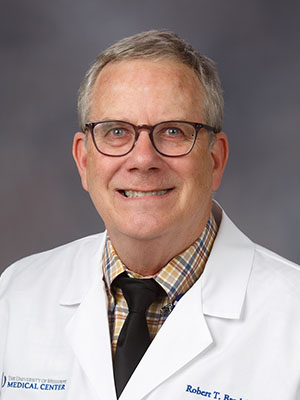
Investigator Highlight: Dr. Robert Brodell
Published on Friday, August 26, 2022
Dr. Robert Brodell, chair of the UMMC Department of Pathology, is a dermapathologist and founding chair of the UMMC Department of Dermatology, a position he recently left to chair pathology. His research focuses on dermatology, and access and barriers to health. He holds multiple awards and is an avid American Cancer Society volunteer, having been inducted to the ACS Relay for Life Hall of Fame.
How long have you worked with your current organization and what type of research do you do?
I have been on the faculty at UMMC for 10 years. My research interests are broad and include HPV infections, tips and tricks in procedural dermatology, rural access to care, quality Assessment/Quality Improvement issues, the history of medicine, and dermatopathology especially as it relates to clinical-pathologic correlation.
Would you describe your most recent research and/or publications?
The research that has had the biggest "splash" in the past year was related to our textbook “Dermatology in Rural Settings: Organizational, Clinical and Socioeconomic Perspectives.” There have been follow-up articles focusing on the "all of the above" approach we take at UMMC to deliver care to rural Mississippians.
How does your recent research and/or publications relate to your overall research within cancer?
A recent article assessed the statement that "Bread-loafed sections from an elliptical excision examine less than 1 percent of the margins of a tumor.” This demonstrated that at least 40 percent of the margins are completely examined and information is provided by bread loafing that is clinically actionable evidence for 99 percent of the margins. While Mohs surgery is still the gold standard for most tumors, this supports a less expensive approach that has been taken for the past 50 years by Mohs surgeons and general dermatologists alike! (Warne MM, MM Klawonn, RT Brodell. Bread loaf sections provide useful information on more than 0.5% of surgical margins, BJD. First published July 5, 2022).
What inspired your most recent research and/or publications?
Statements made by physicians that did not ring exactly true. I found an associate at Georgia Tech who understands geometry much better than me, to provide evidence arguing against an overstated claim.
What advice can you give medical students and/or high-school students who are interested in pursuing a career in research?
Every doctor performs “research” on every patient. We use the best scientific knowledge available and then adjust treatments based on the scientific method. One patient becomes a series of patients. This can lead to double-blind, placebo-controlled trials and even population studies. My advice to students: Join the health care team and you will find ways to contribute to the science of medicine.


